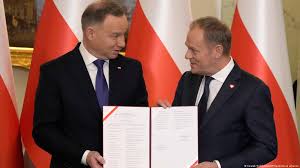The day before, all Polish and most international mass media covered the conflict in which conservative President Andrzej Duda and liberal pro-European Prime Minister Donald Tusk were involved in one way or another. On Tuesday evening, the local police rushed to the territory of the presidential palace with a search. Law enforcement officers were looking for former Minister of Internal Affairs Mariusz Kaminski and his deputy Macek Vasyk, who took refuge in the residence of the head of state. Earlier, a warrant was issued for the arrest of the specified persons, sanctioned by the acting prime minister.
“Poland is two-state”, “Official Warsaw is waiting for chaos”, “Duda vs. Tusk: who will win?” – here is a far from complete list of bright headlines in the press from Ottawa to Wellington, which could not better characterize the situation in this European country. Moreover, observers often did not skimp on loud epithets, sometimes calling the president a “victim of the prime minister’s conspiracy”, sometimes comparing Tusk with the hero of epics, fighting evil. But the fact remains: the head of the Polish Cabinet of Ministers and the current president entered into a confrontation in which everyone has an equal chance of winning. Or the chances of losing – who likes it better.
The history of the notorious confrontation goes back to the distant past. A few years ago, Tusk accused Duda of machinations and abuse of power. And in 2015, these accusations actually ceased to be baseless. At that time, the president amnestied Kaminsky and Vasyk, who were accused of adultery. After the inauguration of Tusk’s government, the Supreme Court invalidated the amnesty decision, citing the fact that it was signed by the president before the final verdict. Meanwhile, the Constitutional Court, where the majority of judges were appointed under the previous government, ruled that the decision on amnesty in 2015 is valid, Digi24 reports.
Kamynskyi and Vasyk, who learned about the warrant for their arrest, spent most of Tuesday, January 9 of this year, with their patron Duda. However, at the moment when Duda left for a meeting with representatives of the Belarusian opposition, the police entered the presidential palace and still arrested them. In response to this, Kaminsky announced a hunger strike, calling himself “Poland’s first political prisoner since 1989.” According to some reports, Vasyk promised to spread the classified information on Tusk and his team. What can be contained in this compromising material, not even the most venerable analysts can guess.
One thing is clear – the case will not be limited to the arrested newly appeared dissidents. About a month ago, Prime Minister Tusk’s team launched an initiative to reorganize Poland’s largest mass media – the RAR Agency, public television TVP and several radio stations. President Duda’s team called on their supporters to “actively resist the attack on freedom of speech, which is approaching boiling point.”
There is no doubt that this degree will increase in the future.


